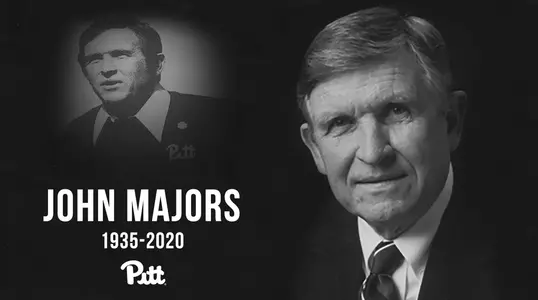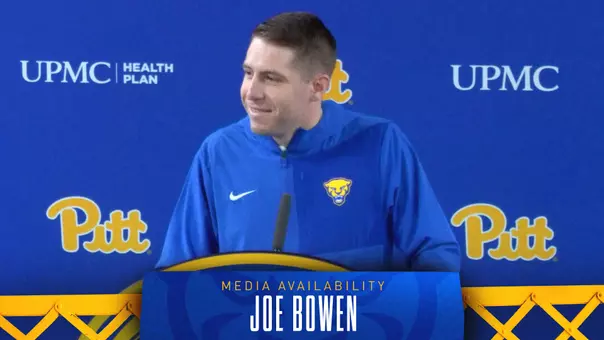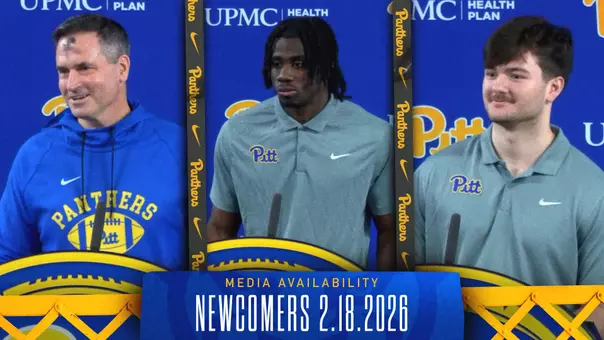University of Pittsburgh Athletics

Iconic Pitt Football Coach Johnny Majors Passes Away at Age 85
6/3/2020 12:00:00 PM | Football
PITTSBURGH—John Majors, who orchestrated one of the most dramatic turnarounds in college football history in leading Pitt to the 1976 national championship, passed away overnight. He was 85.
Nearly five decades after his initial arrival at Pitt in December 1972, Majors remains an iconic figure in Panthers' lore. He will be forever revered for leading Pitt's remarkable four-year transformation in the 1970s: 1-10 the year prior to his arrival to undefeated national champions a mere four seasons later.
"I am saddened upon hearing of the passing of my beloved coach, Johnny Majors," said legendary Pitt running back Tony Dorsett, the biggest gem in Majors' first Pitt recruiting class. "He was more than just an integral part of my college football career; he was a dear friend who continued his relationship with me far beyond my playing days. He took a young high school kid and showed him how to be a leader and a man. My prayers are with his family, the Pitt community and all the players and coaches who have been a part of his life. Rest in heaven, Coach."
"Coach Majors set a standard at Pitt that all of us—coaches, student-athletes and administrators—continue to be inspired by," Director of Athletics Heather Lyke said. "His championship legacy resonates in our department to this very day. On a personal note, it was such an honor to welcome him back for enshrinement in the Pitt Athletics Hall of Fame last fall. Coach Majors always told me, 'Pitt people are as passionate and loyal as they come.' I think that description also perfectly describes him. He remained so loyal and committed to Pitt."
"Coach John Majors was, and always will be, an important part of the University of Pittsburgh's history," said Chancellor Patrick Gallagher. "He is a celebrated championship-winning coach, but his impact on our players endured long after they hung up their helmets for the last time. On behalf of our extended university community, our thoughts are with Johnny's family and loved ones during this difficult time."
"From the time I arrived at Pitt, Coach Majors was always incredibly supportive and so enthusiastic about Pitt and our football program," said Pat Narduzzi, Pitt's head football coach. "We have so many reminders around our facility of Coach Majors and his time here: the photos, bowl trophies and, of course, the 1976 national championship trophy. He is a coaching legend and his impact on Pitt will never be forgotten."
"Coach Majors was not only a dynamic football coach and tremendous motivator, but other than my parents, he was probably the best teacher I ever had in my life," said John Pelusi, the starting center for Pitt's 1976 title team and now a member of the University's Board of Trustees. "He taught me so much about what you can accomplish through teamwork, focus and hard work. So much of what I've been able to accomplish in life can be attributed to the values and lessons Coach Majors instilled in me."
In a profession where longevity can be elusive, Majors enjoyed a remarkably lengthy and accomplished coaching career.
Over 29 years as a head coach, Majors posted an overall record of 185-137-10, including a 116-62-8 mark at Tennessee (1977-92), a 45-45-1 mark at Pitt (1973-76, '93-'96), and a 24-30-1 record at Iowa State (1968-72). During an era when postseason games were far less abundant, 16 of his 29 teams earned bowl invitations.
But the trademark of Majors' coaching career was his ability to elevate football programs to new heights. Majors forged a reputation as a program builder.
In his first head football coaching position, Majors took over a struggling Iowa State program and guided the team to its first two bowl games in school history.
From there, Majors went to the University of Pittsburgh, where he reached the pinnacle of his coaching career. Inheriting a Pitt squad that had finished 1-10 in 1972, Majors surrounded himself with a young, hard-working and talented coaching staff, and in just four seasons, transformed Pitt's struggling football program into the 1976 national champion. His first prize recruit—Tony Dorsett—had a spectacular career at Pitt, which included being honored with college football's most treasured award—the Heisman Trophy.
In what he considered one of the most difficult decisions of his career, Majors returned to his alma mater to help rejuvenate a stagnant Tennessee football team in 1977. He quickly revived the Volunteers into an SEC and national power.
Nearly 20 years to the day Majors arrived at Pitt the first time, the Panthers summoned him back to Pittsburgh in December 1992. While not as dramatic as his first tour, Majors lured many players that formed the nucleus of Pitt's 1997 Liberty Bowl team, a squad that helped set into motion the revival that put the Panthers annually in the postseason picture once again.
Majors first arrived at Pitt in 1972 after a five-year stint as head coach at Iowa State, during which he had established himself as one of the bright young minds in college football. He immediately began recruiting the blue-chip talent that would provide the impetus for Pitt's national championship in 1976 and the Panthers' dominance of Eastern football into the early 1980s.
Dorsett was the plum of Majors' first recruiting class, which also included defensive linemen Al Romano, Gary Burley and Don Parrish, as well as quarterback Robert Haygood, tight end Jim Corbett, linebackers Cecil Johnson and Arnie Weatherington, and placekicker Carson Long. Over the next few years Majors continued to recruit exceptional players who would play key roles in Pitt's drive toward a national championship, including quarterback Matt Cavanaugh, running back Elliott Walker, defensive lineman Randy Holloway and wide receiver Gordon Jones.
Majors wasted little time beginning the turnaround at Pitt. In 1973, he guided the Panthers to a winning record (6-5-1) for the first time in 11 years. Pitt also landed a berth in the Fiesta Bowl, its first bowl appearance in 17 years. That startling turnaround brought Pitt and its new coach extensive national attention, and earned Majors National Coach of the Year honors by both the Football Writers Association of America (FWAA) and the Walter Camp Foundation.
Majors led Pitt to a second consecutive winning season (7-4) in 1974. That year, the Panthers made an appearance on national television for the first time since 1963, while Pitt's home attendance was twice the 1972 average.
In 1975, Pitt's ascendance continued as the Panthers clawed their way to an 8-4 season that included a victory over Kansas in the Sun Bowl and a No. 15 final national ranking by the Associated Press.
Then came the magical 1976 season. A dominating, nationally televised 31-10 victory at Notre Dame in Pitt's opener set the tone for the season. The Panthers were undefeated the rest of the way, capping their 11-0 regular-season record with a 24-7 win over Penn State. Pitt, ranked number one in every national poll, was invited to the Sugar Bowl, where the Panthers crushed Georgia, 27-3, to win the national championship.
Pitt started three different quarterbacks in 1976 due to injuries. Original starter Haygood was lost to injury in the season's second game. Cavanaugh missed three contests due to injury, forcing walk-on Tom Yewcic into service. Yet, the Panthers remained undaunted in route to an undefeated season.
Majors again was named Coach of the Year, while Dorsett, who set or tied 18 NCAA records during his fabulous career at Pitt (including the career rushing yardage record of 6,082), won the Heisman Trophy.
After the 1976 season, Majors returned to Tennessee as the Vols' head coach, and before long he was shaping the program into an SEC power. Tennessee won SEC championships in 1985, 1989 and 1990. Lofty rankings in the polls characterized Tennessee football throughout his tenure.
Tennessee was a perennial bowl team under Majors, earning invitations to the Sugar (twice), Peach (twice), Fiesta, Cotton, Citrus, Sun, Liberty, Garden State and Hall of Fame bowls during his last 12 years there.
Majors' professional stature was reflected when he served as president of the American Football Coaches Association (AFCA) in 1990. That same year, Tennessee's SEC title gave the school its first back-to-back conference championships since the Vols won three in a row from 1938-40.
A member of the most famous football family in Tennessee, Majors was destined to carry on family tradition. His father, the late Shirley Majors, was a successful high school coach for 13 years in Tennessee and later served for 21 years as the head coach at Sewanee (University of the South), compiling a record of 93-74-5. He was selected as the Football Writers Association Small College Coach of the Year in 1973, the same year his son, John received the Division 1A Coach of the Year honor at Pitt. Two of John's brothers, Bill and Bobby, were great stars at Tennessee. Another brother Joe, starred at Florida State, while a fourth brother, Larry, played for his father at Sewanee.
John was the biggest football star in the Majors family. He played for his father at Huntland High School, where he scored an incredible 565 points. As an All-America tailback at Tennessee, he led the Vols to a 10-0 record in 1956, a No. 2 ranking and a trip to the Sugar Bowl. That year he was named United Press International's Back of the Year and finished second to Notre Dame's Paul Hornung in the Heisman Trophy balloting. Majors was inducted into the College Football Hall of Fame as a player in 1987.
Majors was twice named MVP in the SEC, and in 1975 was named to the 25-year All-SEC Team (1950-74). The entire Majors family, including mother Elizabeth and sister Shirley Ann, were charter inductees into the Tennessee Hall of Fame in 1966.
Following his brilliant playing career at Tennessee, Majors began his coaching career as an assistant at his alma mater in 1957. He served additional stints as an assistant at Mississippi State (1960-63) and Arkansas (1964-67) before taking the head job at Iowa State in 1968, where he earned Big Eight Coach of the Year honors from both wire services in 1971.
John Terrill Majors was born on May 21, 1935 in Lynchburg, Tennessee. He and his wife, Mary Lynn, have a son, John, and a daughter, Mary.
#H2P | Facebook | Twitter | Instagram
Nearly five decades after his initial arrival at Pitt in December 1972, Majors remains an iconic figure in Panthers' lore. He will be forever revered for leading Pitt's remarkable four-year transformation in the 1970s: 1-10 the year prior to his arrival to undefeated national champions a mere four seasons later.
"I am saddened upon hearing of the passing of my beloved coach, Johnny Majors," said legendary Pitt running back Tony Dorsett, the biggest gem in Majors' first Pitt recruiting class. "He was more than just an integral part of my college football career; he was a dear friend who continued his relationship with me far beyond my playing days. He took a young high school kid and showed him how to be a leader and a man. My prayers are with his family, the Pitt community and all the players and coaches who have been a part of his life. Rest in heaven, Coach."
"Coach Majors set a standard at Pitt that all of us—coaches, student-athletes and administrators—continue to be inspired by," Director of Athletics Heather Lyke said. "His championship legacy resonates in our department to this very day. On a personal note, it was such an honor to welcome him back for enshrinement in the Pitt Athletics Hall of Fame last fall. Coach Majors always told me, 'Pitt people are as passionate and loyal as they come.' I think that description also perfectly describes him. He remained so loyal and committed to Pitt."
"Coach John Majors was, and always will be, an important part of the University of Pittsburgh's history," said Chancellor Patrick Gallagher. "He is a celebrated championship-winning coach, but his impact on our players endured long after they hung up their helmets for the last time. On behalf of our extended university community, our thoughts are with Johnny's family and loved ones during this difficult time."
"From the time I arrived at Pitt, Coach Majors was always incredibly supportive and so enthusiastic about Pitt and our football program," said Pat Narduzzi, Pitt's head football coach. "We have so many reminders around our facility of Coach Majors and his time here: the photos, bowl trophies and, of course, the 1976 national championship trophy. He is a coaching legend and his impact on Pitt will never be forgotten."
"Coach Majors was not only a dynamic football coach and tremendous motivator, but other than my parents, he was probably the best teacher I ever had in my life," said John Pelusi, the starting center for Pitt's 1976 title team and now a member of the University's Board of Trustees. "He taught me so much about what you can accomplish through teamwork, focus and hard work. So much of what I've been able to accomplish in life can be attributed to the values and lessons Coach Majors instilled in me."
In a profession where longevity can be elusive, Majors enjoyed a remarkably lengthy and accomplished coaching career.
Over 29 years as a head coach, Majors posted an overall record of 185-137-10, including a 116-62-8 mark at Tennessee (1977-92), a 45-45-1 mark at Pitt (1973-76, '93-'96), and a 24-30-1 record at Iowa State (1968-72). During an era when postseason games were far less abundant, 16 of his 29 teams earned bowl invitations.
But the trademark of Majors' coaching career was his ability to elevate football programs to new heights. Majors forged a reputation as a program builder.
In his first head football coaching position, Majors took over a struggling Iowa State program and guided the team to its first two bowl games in school history.
From there, Majors went to the University of Pittsburgh, where he reached the pinnacle of his coaching career. Inheriting a Pitt squad that had finished 1-10 in 1972, Majors surrounded himself with a young, hard-working and talented coaching staff, and in just four seasons, transformed Pitt's struggling football program into the 1976 national champion. His first prize recruit—Tony Dorsett—had a spectacular career at Pitt, which included being honored with college football's most treasured award—the Heisman Trophy.
In what he considered one of the most difficult decisions of his career, Majors returned to his alma mater to help rejuvenate a stagnant Tennessee football team in 1977. He quickly revived the Volunteers into an SEC and national power.
Nearly 20 years to the day Majors arrived at Pitt the first time, the Panthers summoned him back to Pittsburgh in December 1992. While not as dramatic as his first tour, Majors lured many players that formed the nucleus of Pitt's 1997 Liberty Bowl team, a squad that helped set into motion the revival that put the Panthers annually in the postseason picture once again.
Majors first arrived at Pitt in 1972 after a five-year stint as head coach at Iowa State, during which he had established himself as one of the bright young minds in college football. He immediately began recruiting the blue-chip talent that would provide the impetus for Pitt's national championship in 1976 and the Panthers' dominance of Eastern football into the early 1980s.
Dorsett was the plum of Majors' first recruiting class, which also included defensive linemen Al Romano, Gary Burley and Don Parrish, as well as quarterback Robert Haygood, tight end Jim Corbett, linebackers Cecil Johnson and Arnie Weatherington, and placekicker Carson Long. Over the next few years Majors continued to recruit exceptional players who would play key roles in Pitt's drive toward a national championship, including quarterback Matt Cavanaugh, running back Elliott Walker, defensive lineman Randy Holloway and wide receiver Gordon Jones.
Majors wasted little time beginning the turnaround at Pitt. In 1973, he guided the Panthers to a winning record (6-5-1) for the first time in 11 years. Pitt also landed a berth in the Fiesta Bowl, its first bowl appearance in 17 years. That startling turnaround brought Pitt and its new coach extensive national attention, and earned Majors National Coach of the Year honors by both the Football Writers Association of America (FWAA) and the Walter Camp Foundation.
Majors led Pitt to a second consecutive winning season (7-4) in 1974. That year, the Panthers made an appearance on national television for the first time since 1963, while Pitt's home attendance was twice the 1972 average.
In 1975, Pitt's ascendance continued as the Panthers clawed their way to an 8-4 season that included a victory over Kansas in the Sun Bowl and a No. 15 final national ranking by the Associated Press.
Then came the magical 1976 season. A dominating, nationally televised 31-10 victory at Notre Dame in Pitt's opener set the tone for the season. The Panthers were undefeated the rest of the way, capping their 11-0 regular-season record with a 24-7 win over Penn State. Pitt, ranked number one in every national poll, was invited to the Sugar Bowl, where the Panthers crushed Georgia, 27-3, to win the national championship.
Pitt started three different quarterbacks in 1976 due to injuries. Original starter Haygood was lost to injury in the season's second game. Cavanaugh missed three contests due to injury, forcing walk-on Tom Yewcic into service. Yet, the Panthers remained undaunted in route to an undefeated season.
Majors again was named Coach of the Year, while Dorsett, who set or tied 18 NCAA records during his fabulous career at Pitt (including the career rushing yardage record of 6,082), won the Heisman Trophy.
After the 1976 season, Majors returned to Tennessee as the Vols' head coach, and before long he was shaping the program into an SEC power. Tennessee won SEC championships in 1985, 1989 and 1990. Lofty rankings in the polls characterized Tennessee football throughout his tenure.
Tennessee was a perennial bowl team under Majors, earning invitations to the Sugar (twice), Peach (twice), Fiesta, Cotton, Citrus, Sun, Liberty, Garden State and Hall of Fame bowls during his last 12 years there.
Majors' professional stature was reflected when he served as president of the American Football Coaches Association (AFCA) in 1990. That same year, Tennessee's SEC title gave the school its first back-to-back conference championships since the Vols won three in a row from 1938-40.
A member of the most famous football family in Tennessee, Majors was destined to carry on family tradition. His father, the late Shirley Majors, was a successful high school coach for 13 years in Tennessee and later served for 21 years as the head coach at Sewanee (University of the South), compiling a record of 93-74-5. He was selected as the Football Writers Association Small College Coach of the Year in 1973, the same year his son, John received the Division 1A Coach of the Year honor at Pitt. Two of John's brothers, Bill and Bobby, were great stars at Tennessee. Another brother Joe, starred at Florida State, while a fourth brother, Larry, played for his father at Sewanee.
John was the biggest football star in the Majors family. He played for his father at Huntland High School, where he scored an incredible 565 points. As an All-America tailback at Tennessee, he led the Vols to a 10-0 record in 1956, a No. 2 ranking and a trip to the Sugar Bowl. That year he was named United Press International's Back of the Year and finished second to Notre Dame's Paul Hornung in the Heisman Trophy balloting. Majors was inducted into the College Football Hall of Fame as a player in 1987.
Majors was twice named MVP in the SEC, and in 1975 was named to the 25-year All-SEC Team (1950-74). The entire Majors family, including mother Elizabeth and sister Shirley Ann, were charter inductees into the Tennessee Hall of Fame in 1966.
Following his brilliant playing career at Tennessee, Majors began his coaching career as an assistant at his alma mater in 1957. He served additional stints as an assistant at Mississippi State (1960-63) and Arkansas (1964-67) before taking the head job at Iowa State in 1968, where he earned Big Eight Coach of the Year honors from both wire services in 1971.
John Terrill Majors was born on May 21, 1935 in Lynchburg, Tennessee. He and his wife, Mary Lynn, have a son, John, and a daughter, Mary.
#H2P | Facebook | Twitter | Instagram
Pitt Football | Meet the defensive backs!
Monday, February 23
Pitt Football | The Pitt Iron Works
Saturday, February 21
Pitt Football | Newcomer Media Availability | 2.11.26
Friday, February 20
Pitt Football | Newcomer Media Availability | Defensive Backs | 2.13.26
Friday, February 20



